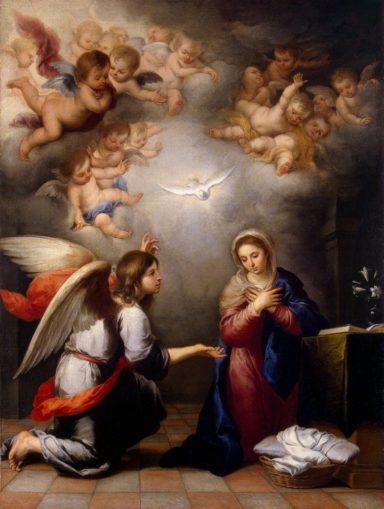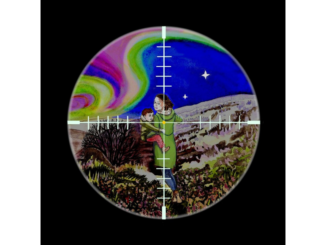
Bartolomé Esteban Murillo [Public domain], via Wikimedia Commons
“In the beginning was the Word. and the Word was with God, and the Word was God. The same was in the beginning with God. All things were made by Him, and without Him was not anything made that was made. In Him was life: and the life was the light of men. And the light shineth in the darkness and the darkness comprehended it not.”
Those first five verses are some of my favourites in the entire Bible – the succinct poetry of the King James’ version based on William Tyndale’s earlier translation, the brevity of the profound concepts being expressed, the vividity of the imagery employed…
I could expound for quite a while on the meaning of those verses, how John the Apostle was writing in a Greek cultural environment, spending much of his life evangelising in the Greek cities of what is now Turkey, and in exile on the Greek island of Patmos. Followers of Greek philosophers such as Plato and Aristotle would have grasped better than we today what John was saying, his use of the word logos, here translated as the Word, but which here perhaps better means Reason or God’s Reason, as a metaphor for Christ, the rational law based order of His Creation implied by the word logos, his employment of the metaphor of Light for life giving Divine Wisdom and Truth, and Darkness for death dealing Ignorance and Evil… John was expressing the insights afforded by the life and teaching of Jesus in terms that a Greek of the day would comprehend, and to appreciate fully the significance of this you have to remember that Greek culture, ideas and language were the equivalent of English today – dominant in the ancient world – a Greek cultural and intellectual universe that stretched around the entire Mediterranean and as far as the Indus Valley and the Steppes of Central Asia.
But what I would like to do here is to explain what John is trying to tell us and why he starts his Gospel with this extraordinary passage of prose and not with the nativity of Jesus. John is here setting the scene for Jesus’ mission on Earth and saying that Jesus’ birth and life are the expression of God’s Reason – the Rational Nature of God’s Creation that follows physical laws, His plan, His unique physical intervention in the affairs of humanity, a species that all too easy wanders into darkness
So why come as a humble working-class baby, and not as a king or Emperor in full power as the Jewish theologians and scholars of the day had expected – that He did not is why they rejected Him after all? Is it not an incredible paradox that God came to Earth naked, vulnerable, defenceless, utterly obscure, and from the minute of His Birth was in danger of being murdered by the authorities?
And here I think we start to glimpse the way in which God works within His creation – He works according to His purposes and methods, not ours. He does not conform to our expectations but confounds them, as the Book Of Job discussed at length ‘His ways are not our ways’. This is why the ancient Jews and so many people today – they expect God to be trapped in their view of the way things should be done. His means of furthering His ends seem paradoxical, even nonsensical to us, but He is entirely rational in His lights if we step back and try to see the bigger picture.
We cannot on our own comprehend God by our own efforts any more than a microbe can comprehend a Blue Whale or the darkness can understand light. Our limited monkey descended brains can only grasp the simplest things that He has chosen to reveal of Himself to us – it’s why He came as an obscure baby and lived among us so that we can comprehend something of His message for us by way of the example of His life among us. He spoke in parables constantly that the uneducated could understand for this reason. It’s why the faithful must refrain from the temptation of “I know what God had for breakfast” hubris, why everything a Christian needs to know for faith is in the Bible and why they should resist the claims of clerics and “tradition” to gnosis (special knowledge) or higher understanding/authority in interpreting His message. Christ after all was vitriolic about the clerics and theologians of His own day.
Furthermore, He gave humanity the gift of Free Will because He wants us to love him willingly as He loves us. Love must be freely given to exist, otherwise it is not love. If He had come in power, as He has promised He will one day, had revealed Himself in full to us, we would be overwhelmed and our Freedom of Will destroyed by our awe, and so He had to come to Earth with His power masked in order to offer humanity another chance of redemption discreetly while maintaining our freedom of choice. Hence the apparent paradox of His coming as a defenceless baby, the utter subtlety of His management of Creation through the mechanisms of the Laws of Physics so that His fingerprints are almost entirely invisible to us.
For me, this is a conception of God revealed here by John entirely consistent with the God evoked by the first verses of the Creation allegory in Genesis, a God so much greater than that imagined by the likes of Dawkins, a God outside and within Time and Space, the Laws of Physics being just part of His logos, a God who works with such subtly that we cannot see Him, a God of paradoxes, a God who is so great that we in our darkness can only begin to comprehend His Will for us in the Light of Christ’s example and message. The metaphor of Divine light guiding a humanity lost in darkness is a powerful one indeed.
When the Saxon king Edwin of Northumbria was contemplating converting to Christianity in the 620s AD, the great Anglo-Saxon historian the Venerable Bede tells thus that he held a conference of his many counsellors and nobles to discuss the issue. Bede records that one noble summed up the decision to be made as follows…
“Your Majesty, when we compare the present life of man on earth with that time of which we have no knowledge, it seems to me like the swift flight of a single sparrow through the banqueting-hall where you are sitting at dinner on a winter’s day with your thegns and counsellors. In the midst there is a comforting fire to warm the hall; outside the storms of winter rain or snow are raging. This sparrow flies swiftly in through one door of the hall, and out through another. While he is inside, he is safe from the winter storms; but after a moment of comfort, he vanishes from sight into the wintry world from which he came. Even so, man appears on earth for a little while; but of what went before this life or of what follows, we know nothing. Therefore, if this new teaching has brought any more certain knowledge, it seems only right that we should follow it.”
Here we see our ancestors instinctively understood the metaphor of Divine Light for understanding of the human condition and the way out of human hubris and ignorance.
And that is what Christmas is about in the darkest time of the northern hemisphere’s year. The darkness would rather we don’t look at the light of Christ but remain in ignorance, would rather we don’t venture out to church on a mid winter dark night. It’s why we festoon our beautiful church with Christmas lights and candles, as do so many others, it’s why the faithful ask God to keep us in His light each and every day so that we don’t get lost in the darkness, it’s why we remember His paradoxical nature in choosing to be born as a humble baby, it’s why Christmas is a special time when we celebrate the blessings of our lives and families and friends right now.
May you live in the light and the darkness retreat from you as you journey through the next and every year to come, and may I wish you a very Happy Christmas.
© 1642again 2019
The Goodnight Vienna Audio file


